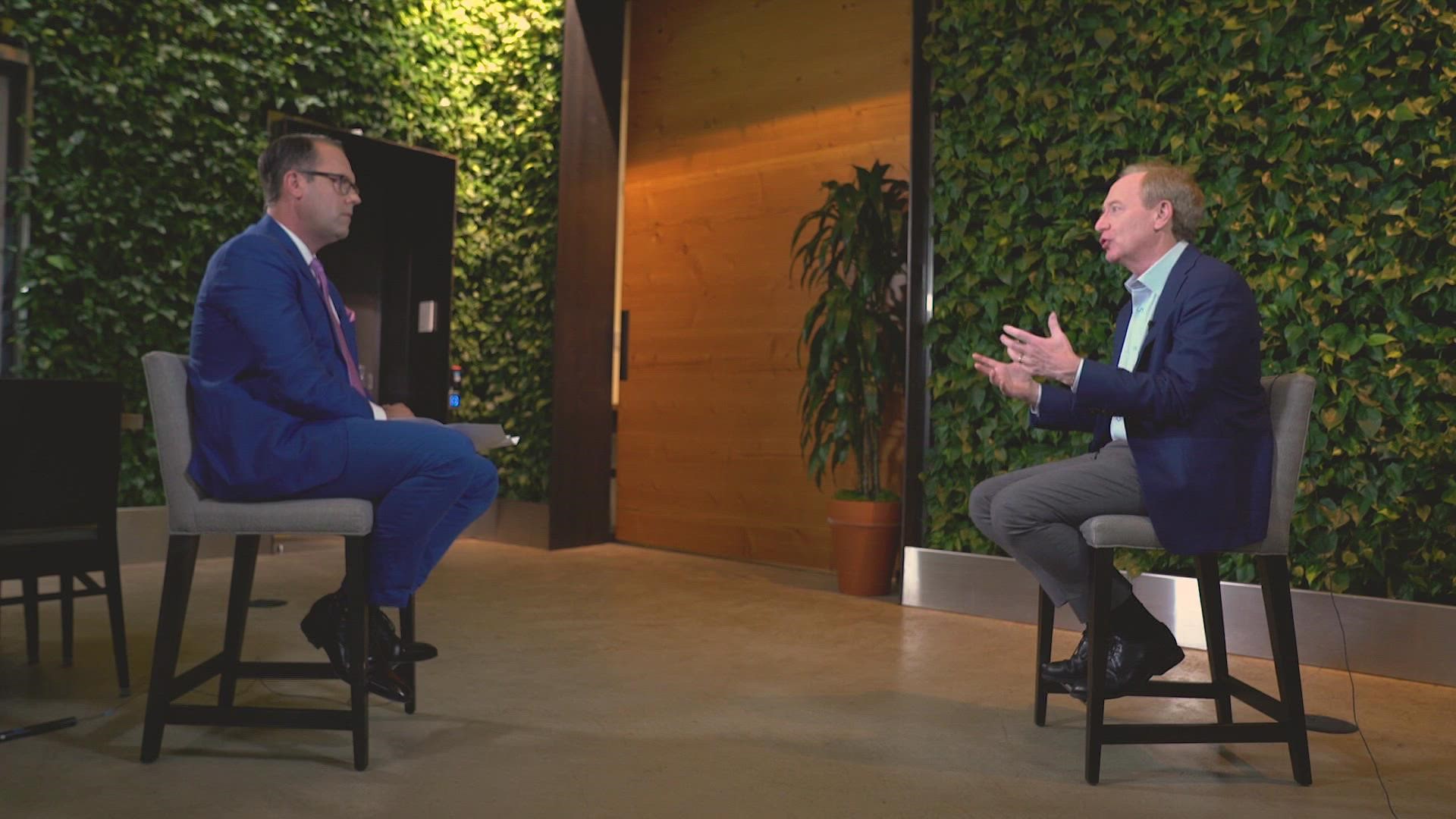REDMOND, Wash. — Downtown Renton isn’t necessarily a tech hub, nor is it directly tied to the Microsoft Campus.
However, the roof over Wesley Reiber’s head can be directly linked.
“Wages aren’t keeping up with inflation, which means that people are losing money, even though they’re making the same dollar amount at work,” said Reiber, as he sat inside the 95 Burnett apartment complex talking about how he found his way here.
Reiber said he’s struggled during the pandemic and owns a cleaning company.
It’s a path that be traced back nearly 30 years.
Once upon a time, Microsoft was just an Albuquerque-based startup before a couple of guys named Paul and Bill decided to settle down on 88 acres in a then one-stoplight town named Redmond. They powered up PC’s, and the region’s job base, while simultaneously flooding the area with tech talent that arguably paved the way for Amazonian growth years later.
“I think Microsoft today is actually a very diversified tech company. There’s no single label,” said Microsoft President Brad Smith said during a recent sit-down conversation with KING 5.
Smith joined the company in 1993 and remembers when it was corporate enemy number one. It was sued by the justice department and battered by the Federal Trade Commission over its handling of the Windows platform and Internet Explorer browser. Microsoft was synonymous with anti-trust and monopolization.
“I think one of the things that we've learned is that one of the greatest potential strengths of anyone for anyone, is a sense of humility,” said Smith.
That sense of political tact, when combined in tandem with CEO Satya Nadella, has gone a long way towards changing local and national perceptions. Back in 2020, Congress called on "Big Tech" CEOs to testify about anti-trust and privacy issues. Apple, Amazon, Google, and Facebook were all represented. One-time government nemesis Microsoft was not.
In a time when social media has been blamed for polarization, Microsoft, which owns LinkedIn, has also avoided the same kind of scrutiny.
“I do feel good about where we are at LinkedIn. When you look at LinkedIn, I think it has a culture and just a sense of purpose. That makes it a little easier to address issues around this information,” said Smith.
Microsoft has consistently been atop the list of the world’s most valuable companies in the past several months. They perhaps also gained some local goodwill with a $750 million commitment to build or fund affordable housing, in places like that apartment complex in Renton.
However, since the initial announcement in 2019, the timing of implementation has been a little vague.
“I didn’t even know Microsoft is involved,” said a surprised Reiber.
The company says it put $17.5 million into the building, in a complex financing program, which kept half the units available for families earning below median income
“We've spent now more than half a billion dollars, that's already translated into either the creation or preservation of about 10,000 additional homes. That's the good news. Unfortunately, I think there's a lot of bad news as well. Every day I feel like a half a billion dollars is a smaller drop in a bigger bucket than it was six or 12 months before,” he said. “I do think it is one of the problems of our time for our region. I do think it's going to call on all of us to find new forms of cooperation. I think it's good to especially call on city councils, the county council in King County, that's where the rubber meets the road.”
At times, however, it seems as if that is easier said that done. Smith has become a very vocal proponent of mass transit, and light rail. He’s even pitched broader, bigger visions of a Cascadia rapid rail line.
It’s a point he makes when discussing the plans to expand the Microsoft campus, a project that is well under way now. On a rainy day, hundreds of workers were seen scrambling around to construct 2.5 million new square feet of office space to be done by the end of next year. There are plans to renovate 7 million more square feet. The plans were announced well before anyone foresaw a global pandemic or the desire to work from home.
“To me (it) starts with our campus and making it more accessible to people connecting by light rail. You’ll be able to get here on Sound Transit. Those kinds of things helping you live farther away. I do think it’s going to take more money from big companies, but also by government and the public. It is going to take more zoning changes. I ultimately think that we need to spread growth out.”

